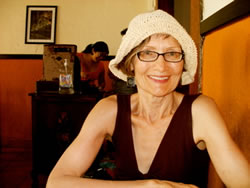Patricia Henley

photo credit: David Laughton |
Patricia Henley began writing in 1970. She has published short stories, novels, poetry, and essays. Her books have been published by Three Rivers Press, Carnegie Mellon Press, Graywolf Press, MacMurray and Beck, Pantheon, and Anchor Books. Her first novel, Hummingbird House, was a finalist for The National Book Award. Engine Books (www.enginebooks.org) will publish a collection of her stories, Other Heartbreaks, in October 2011. She has taught for 24 years in the MFA Program at Purdue University. www.patriciahenley.org www.enginebooks.org | |
Of Muscle Cars and Newfound Faith |
 |
|
Yesterday I had lunch with my publisher and editor—Victoria Barrett of Engine Books—and her husband at a Middle Eastern restaurant a ten-minute walk from my home in West Lafayette, Indiana. We talked about their Indy neighborhood, gardening, her writing, his writing, our animals, a screenplay I wrote ten years ago, and what price tag she ought to put on the e-version of my new collection of stories, out in October 2011, Other Heartbreaks. She whipped out her iPhone and revealed potential cover designs for the other three books she plans to publish this year, fiction by Sybil Baker, Greg Spatz, and Myfanwy Collins. She had driven up from Indianapolis to deliver ten Advance Reader Copies of Other Heartbreaks. A remarkable event. Writers aren't frequently visited by their publishers/editors. Although I do recall Fred Ramey of Unbridled Books telling me about flying to another city to work with a writer in his home. Fred, like Victoria, seems to believe in editing as midwifery. The Engine Books website (www.enginebooks.org) makes clear Victoria's policy: "Every book deserves close editorial attention at every level. Expect the titles published by Engine Books to have been stringently polished to reveal the best possible execution of the author's vision." If we're honest, writers, isn't that what we crave? Close attention? To our visions? When I was a young writer I naively assumed that Maxwell Perkins would surely be channeled by editors of our era. I imagined the best of all worlds, a niche in a solid New York publishing house with an editor who knew my body of work. Someone who would be there for me. Shortly before her death, I went to hear Anne Sexton read in Baltimore. She said, "Writers should be forgiven their bad books." My relationship with this imaginary editor would have the necessary bedrock of trust that would allow for forgiveness. And, perhaps, stringent editorial attention. After much good luck and bad with publishing, that editor has come into my life. A few years ago I wrote an essay for Glimmer Train titled "The Potholder Theory of Literary Ambition." (www.glimmertrain.com/henleyb20.html) Some of my publishing war stories are in that essay. But what it comes down to, then and now, is that I view writing stories as a craft to be practiced, much as I made those little potholders as a girl, without outsized ambitions. And when the stories are finished I look around for likely customers. Still, it's sweetly unexpected to have found an independent publisher sixty miles from home. Like selling potholders in my neighborhood when I was eight years old. But the stories in Other Heartbreaks are not destined to stay in the neighborhood. When you go to the Engine Books website you'll see a muscle car in twilight, like a souped-up vehicle beckoning you to take a rock-and-roll infused road trip when you were twenty. Get in, the site commands. Victoria Barrett wants to take you for a ride. In February of 1976 I hitchhiked to Port Townsend, Washington, to visit Copper Canyon Press. I did not have an appointment; I was simply drawn there by intuition. I walked into the plain, white, wooden building at Fort Worden—almost like a barn—and I felt an intense affinity for the place, the gorgeous books of poetry stacked up, the odor of ink and type. Fiction writers sometimes worry that publishing with small presses means that your work stops dead right there. That it won't have much life beyond a small devoted circle. A press like Copper Canyon proves that wrong for poets. In 2005, Copper Canyon poets W.S. Merwin and Ted Kooser won the National Book Award for Poetry and the Pulitzer Prize for Poetry, respectively. And MacMurray and Beck proved that wrong for me, Steve Yarbrough, William Gay, and Susan Vreeland, as well as others. Our writing lives were transformed indelibly by the publication of our novels by a small press. Fiction writers need to have faith that small presses have the dedication and stamina to get their work out in the wider world. E-books, on-demand printing, marketing opportunities via social media, book blogs and podcasts, and unforeseen technologies that might spring up tomorrow like morels in the woods—all this makes it possible for fiction writers to enlarge their audiences in unconventional ways. Last year at the AWP Book Fair at the Marriott Wardman Park Hotel in Washington, D.C., approximately 500 small and university presses displayed their new literary titles and magazines, most of them a feast for the eye and heart. All of the young people involved in this grand conversation give me hope. Engine Books, I'm climbing in the backseat, traveling light. Surprise me. | |
